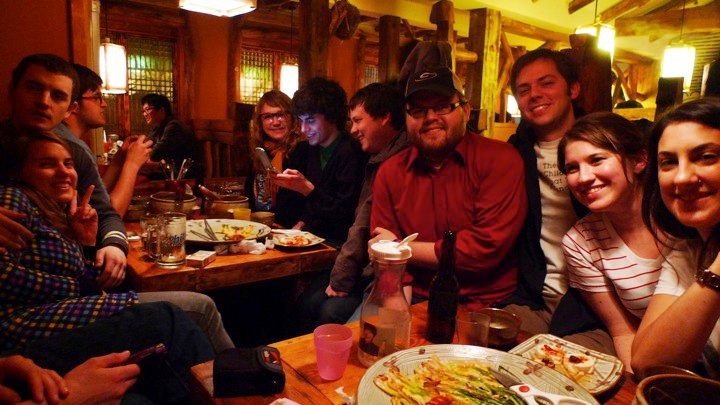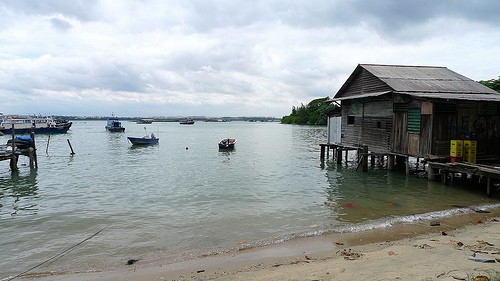Talking with my friend Peter, who was on a visit to Korea from his current home in Shanghai, we got into discussing our respective foreign homes. At a K-League baseball game with my friends and him, he told me it was a nice to hang out with a group of Americans. He said he really didn’t realize he missed hanging with Americans until doing so for nearly the entire weekend.
From what I’ve seen, and what Peter’s told me, Americans are in few numbers on the Shanghai expat circuit. Most people are from everywhere around the world and are in business, manufacturing, media, and in some cases, teaching. He said its hard find a large contingent Americans, as there’s just people from all over the place doing different things (and always a lot of Chinese people). Of the eight or so people that live in his flat, Peter says he is the only one who is an English teacher.
Sadly, Korea is not the case. ROKetship, a one-frame comic on the cultural anecdotes of life on the peninsula nailed the foreigner contingent perfectly a few months ago:

While Americans make up the largest Western group with around 120,000 people, I’m curious if they count the 30,000 American military forces as part of it. There are also many Vietnamese, Indonesian or Pakistani citizens but are relegated to social strata even lower than my own.
I don’t seem to come across many Western business professionals in the country, but they do exist and likely have more than enough money to be seen in places other than where I hang out. But as far as seeing anyone my age in the business of other than teaching is fairly rare. Obviously, it’s difficult to draw direct comparisons to China as it has a billion people and is now the world’s second largest economy. So there will always be disparities.
Getting down to it, the relative size of Korea and culture of foreigners has put Korea firmly, in my opinion, as the place for “emerging adulthood.”
Last month, the New York Times Magazine ran a much-talked about 8,000 word article entitled, “What is it about 20-somethings.” I delved into what psychologists are now calling “emerging adulthood.” This is generally typified by the young college graduates who aren’t afraid to boomerang back home, bounce around jobs through much of their 20s and get married much later.

They compare data from 20-somethings a few decades ago who got married, had children and settled down all before the age of thirty. Now, psychologists are trying to figure out why young people aren’t meeting these so-called life benchmarks like that of their generational predecessors.
The article suggests that people (who have the means and education) to spend a year traveling, teaching abroad, or move back in with their parents are not offsetting their adulthood, like older people seem to think, but are part of a new wave of adolescence in general. Much of the reasoning should be left the article, which you should read.
While I don’t see myself meeting the “benchmarks” of my parents, or in some cases, even people ten years older than me, I don’t necessarily see it as a form of “emerging adolescence.”
This has to do with the Korea-China comparison for a few reasons. Here in Korea, I’m not really surrounded by “professionals” like I was at KPBS or meeting area journalists for brunch on Sunday a morning. The next level is really just getting paid a little more. There are long-term teachers out here, but I’ve never really thought of this kind of teaching as a career.
So, in some cases people are using their time here to arrest their development. In other cases, people are using it as a stepping stone to other things. The latter may apply to “emerging adulthood,” but if it’s a psychological development stage, should it apply to everyone?
Everybody I know in Korea has the same job. I’m sort of in a bubble. That’s not to say that being exclusively around media professionals isn’t a bubble in itself. But rather, it’s difficult to even avoid coming across a non-military or non-English teaching foreigner in this country. I know a few people, (probably less than five) under 30 who are in Korea doing some other kind of work (but also teach part-time).
The one question that everyone asks is: why is this happening now?
I partially blame old people. No, not geriatrics, but the generations of greedy money-grubbers who drove the economy into the ground a few years ago. As a result of the economic crash, delayed retirements and perennial layoffs, there aren’t a whole lot of jobs for young graduates these days. Especially college graduates. While the old timers always say that us young’uns need to pull ourselves up by our bootstraps like they did, they seemed to forget some things.
Education debt has skyrocketed, along with the cost of education, itself compared to thirty years ago. So, we aren’t being lazy boomeranging back home, we are trying to figure our lives out with the hand we were dealt.

Foreign Policy magazine asked their own questions when it came to this New York Times Magazine article: “How do Millenials think about international relations?” I guess by the fact that I saw this article on a site I read on a daily basis, I think there’s a huge disconnect between older people and the understanding of young people.
The FP article isn’t nearly as interesting as the now 106 comments. Most are anecdotes from 20-somethings like me about American foreign policy in general. I think that since most of us came of age during the post-9/11 years, a lot of us are a bit demystified at the supposed hegemonic power of the United States. This generation’s willingness to go abroad illustrates our greater understanding of world politics and the role of the United States around the world compared to other generations.
Because there are not a lot of jobs back home for people like me at the moment, I think I’ll stay abroad longer. People tell me graduate school will only make me overqualified for entry-level work. So, if anything, I’ll just take the experience.
My time out here is a great way to experience some more personal growth without being around a lot of the issues that surround 20-somethings at this point in time. Yes, I feel like I am delaying some of my “adult” growth at the moment, but I now know what I want to do at the next step of my time being overseas. But, I pay my own bills and support myself completely.
My next step, however, is to get a more flexible teaching job. Right now my job is easy. Yes, it can be stressful when dealing with middle school kids, but what makes it easy is the down time. I teach roughly half the time I am in the office. This time allows me to write extensive blog posts.
The problem is that I’m locked here eight hours a day, every workday, even if I’m not teaching. I also cannot hold any extra jobs (as per a clause in my contract) tutoring, freelancing, appearing on TV show extras, etc. I’m stuck and it bothers me. Foreign teachers get treated with distrust from the government legislature down to locals on the street, as if it were inherent in our persona.
If I were to stay at a public school job like this for several years, Korea would be this buffer time between the end of college and the stepping stones of adulthood (as defined by the older generation), not a time for personal growth.
“I think for many it’s just an extension of college,” said my friend Steve, who is also a teacher and also sees his fellow teachers using Korea as an excuse to not grow up. “Keep the party going, do the ‘travel’ thing. [That’s] because this definitely is not like the real world back home and we are definitely not acting like adults.”
I enjoy living overseas and the life that comes with, but I think I would have to diversify my type of work and find ways to use my time abroad to further my list of (possible) career goals. I think that whatever I plan to do, whether it’s in the field of journalism or geography, I would greatly benefit from having extensive time overseas. It will give me an upper hand.
So, wherever I go next (in or outside of Korea), I would still teach English (I have a TESOL certificate) but also try to find work writing, editing or geography related.
I don’t necessarily have a problem with making my time here as an excuse to delay “adulthood,” but if I continue to spend time overseas, I think that I would benefit more by finding various avenues for myself.
So, while I do find my time in Korea as very fun and interesting, just like anything else, what I do with my time here and how I benefit is solely up to me. What lies 6,000 miles away back in California will always be on my mind, but it’s not going to dictate my life at the moment.




